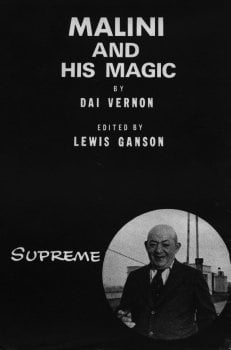|
  In previous articles I have alluded to performing etiquette and when to perform. I mentioned that Max Malini was the only magician to be admitted to the prestigious Friars Club in New York because he was not always pushing his magic on everyone. He would perform when called on only after some prodding. In previous articles I have alluded to performing etiquette and when to perform. I mentioned that Max Malini was the only magician to be admitted to the prestigious Friars Club in New York because he was not always pushing his magic on everyone. He would perform when called on only after some prodding.
The beginner magician is constantly trying to prove to everyone around him that he is a magician and worthy of everyone’s respect. He has just learned a few cool tricks, maybe even owns a cigarette through quarter. He probably even glanced at the instructions and ran through the rudiments of the method (paying no attention to the “effect”) during his one minute practice time.
Perhaps I should stop here for just a moment and cite a passage from Pure Magic! A Primer In Sleight Of Hand by Henry Gross. He states “You spend only a fraction of your time performing; the rest, practicing. If you don’t enjoy practicing, there’s not much point in choosing magic as a hobby. Regard practice as a pleasure, not a chore, and you will make rapid progress.” I don’t want to dwell on the importance of practice in this monograph, so suffice it to say that before you venture out into the unknown, be certain that you have thoroughly practiced every aspect of each effect.
Good performances by good magicians are seldom seen by those spectators whose opinion of “magicians” was tainted by an exceptionally poor performance or by being placed in an embarrassing situation (i.e. 20th Century Bra) by some amateur who insisted that they watch his “tricks . . . and too many of them at that! As it applies to other endeavors, the same is true for the art of magic . . . one bad apple can spoil the bunch.
I understand the urge to show somebody, no, I mean everybody, this new packet card trick or that new zig zag gizmo when I was young in magic. For some, this immaturity in magic lasts a longer than it does in others. Many of us constantly carry some coin trick or other doodad in our pocket every day. It’s like a good luck charm that goes with us everywhere. We would feel naked without it. It becomes just as natural to load our pocket each day as putting on our shoes. We carry this/these geejaws just waiting for someone to ask us to do a trick. We dare them to even hint that they would like to see a trick. We almost literally jump at the chance to show them what we can do. And if they don’t ask, then we can prod them into asking by directing the conversation to magic.
We don’t need to contrive to get people to talk about “magic”, rather we should orchestrate the conversation so that whatever the topic, we can weave our pocket trick into the discussion to demonstrate a point. If we intentionally talk about magic, then everyone will of course expect a trick and part of the impact is lost because of their expectations to be fooled. On the other hand, when you are talking about, say, the recent space shuttle launching and during the discussion you bring out a red piece of paper, fold it like an airplane, ignite it and it floats off into the air, then you have created an “impromptu” miracle and established your position as a wonder worker.
Magic should just happen and seem natural rather than unnatural or contrived. For example, it would seem unnatural to pull out a little plastic box to perform the zig zag cigarette. Compare that to the naturalness of just making a lighted cigarette disappear.
In an informal setting where you are not employed as a magician nor expected to perform, it is not necessary to overwhelm them with how many tricks you have on you or how many tricks with a salt shaker you can do. If you continue, then you are only proving that you beat them to the magic shop. You should stop after two or three effects at the maximum. If you should be asked to continue, then give them your card and mention that you are available for parties, bar mitzvahs, rocket launchings, etc.
Don’t try to show everyone everything that you can do at the very hint of the word “magic” during a discussion. To be more specific, if you are directly asked to show them a trick, then you should not seem so anxious to immediately show them twenty ways to get their selected card to the top of the deck. Wait until you are certain that the request is genuine and not just a polite request to satisfy your need to show them something. Wait until they ask a second time on their own so that you are satisfying their needs. You want the idea to come from them. The impact will be that much stronger and their appreciation will be exponentially greater.
While on the topic of performing in impromptu situations, I would like to briefly elaborate on a Howard Bamman editorial that was published in The Linking Ring many years ago. Why should you give away your best stuff that took time, effort and money to learn and you may feature in your paid performances? What I mean is that if you studied to be an attorney or doctor, then should you be expected to give free legal advice or perform minor surgery when introduced as a professional at a cocktail party? Why is it then that when you are introduced as a magician or a musician at a party, you are asked to perform for free (“Could you play a few Christmas songs on the piano?” or “Do you mind showing us some of your tricks?” “Oh, everyone would love it!”)? Of course everyone would love it, that’s why people pay entertainers to perform at their parties. I have a fundamental problem with performing on command like a trained seal. I feel “used” and not considered a real friend. I feel as if there was a hidden agenda in my receiving the invitation to this party. Of course it could be that you have brought it on yourself by being known to always carry “something” with you and being ready, eager and willing to perform at the drop of a hint.
If we do perform, then it should be because we choose to do it when and where we want. There is nothing wrong with doing a few things to establish/maintain your reputation, but only after a little prompting.
But when should you perform? How long should you wait until the conversation or the situation is just right for you to appropriately insert your effect to make it seem as if real “magic” is taking place? To quote Max Malini “You vait a veek.”
|
